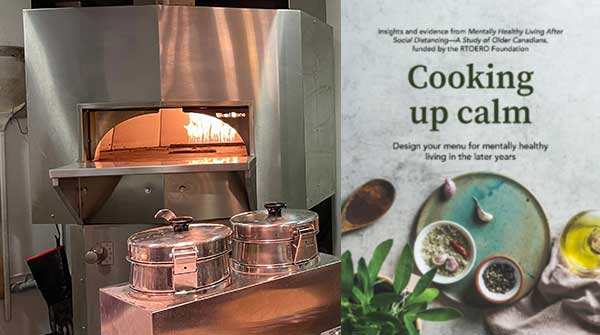‘Cooking Up Calm’ shares wisdom from seniors on mental health and wellness
Let’s face it: Most academic research papers aren’t written with a lay audience in mind. The language can be dry and technical, and it could take years before new discoveries make a difference in most people’s lives.
So when Gail Low, associate professor of nursing, embarked on a study about how Canadian seniors coped with anxiety during the COVID-19 pandemic, she promised to share what she learned more broadly.

Gail Low
The result is a free, downloadable online magazine – Cooking Up Calm – that blends mental health tips and nutritious recipes along with her academic findings.
“This is knowledge and wisdom shared by later-life Canadians for later-life Canadians,” says Low. “It’s a menu of strategies for mentally healthy living, and it speaks to the tenacity and the perseverance of older Canadians.”
 |
| Related Stories |
| Seven reasons we should care about caregivers
|
| Well meaning home care standards just wishful thinking
|
| Seniors prefer home care over institutionalization
|
Low and an international team of experts on epidemiology, aging and mental health surveyed 1,327 Canadians aged 60 and older for their research project, Mentally Healthy Living After Social Distancing – A Study of Older Canadians. The survey was funded by the RTOERO Foundation (Retired Teachers of Ontario) and was conducted in the summer of 2022, just as most COVID restrictions were being lifted.
The researchers found that while, on average, participants scored low on the Geriatric Anxiety Scale, 22 percent experienced severe anxiety, reporting symptoms such as feeling detached and isolated from other people, having a hard time sitting still, and feeling like they had no control over their lives.
Participants who were in good to excellent health felt less anxiety than those in poor to fair health, and the oldest seniors were less anxious than younger seniors even though they were at the highest risk for hospitalization or death from the COVID-19 virus.
“It seems that older people live smarter,” says Low, an expert on quality of life and aging and social isolation, who has also collaborated on more than 100 research papers.
“They have a whole host of coping strategies and if they try something and it doesn’t work, they try something else. It’s a remarkable finding.”
The research team found that of 16 suggested coping strategies, six were the most effective:
- Staying active
- Eating healthy
- Dealing with problems in a structured way
- Getting proper rest and sleep
- Decreasing other sources of stress in life
- Remembering resilience
Other strategies, such as meditation, unplugging from electronic devices and reaching out to loved ones, were less popular and less effective. But it seems the very act of trying different approaches was helpful.
“For nine out of 16 strategies, the effect was small in our multivariate analysis, yet still important,” reports Low. “People seemed to use trial and error: ‘I did this when I lost my sister or I did that when I lost my job, so maybe it’ll be transferable to COVID.’”
Low says the target audience for the tips and recipes in Cooking Up Calm is not only older Canadians but also family caregivers, long-term care staff and many others, even fitness professionals.
“It’s about taking very complex statistics from the study results and turning them into everyday conversations about mental health that you could have with a neighbour, a landlord, a daughter, while making cost-friendly, freezer-friendly shareable nutritious dishes,” says Low, who included a digital designer and a certified research chef on her team.
“We’re making conversations about mental health more palatable,” she says, noting that the threat of COVID-19 is still present for seniors.
Low says the positive feedback she has received about the project has also helped her deal with her own pandemic stress.
“I wanted to find a way to resolve my feelings of helplessness during lockdown – of not knowing how to help others – and turn that around in a very concrete way,” Low says. “This project has helped me think about addressing social isolation differently, and it has given me a sense of hope.”
| By Gillian Rutherford
This article was submitted by the University of Alberta’s Folio online magazine, a Troy Media Editorial Content Provider Partner.
The opinions expressed by our columnists and contributors are theirs alone and do not inherently or expressly reflect the views of our publication.
© Troy Media
Troy Media is an editorial content provider to media outlets and its own hosted community news outlets across Canada.

